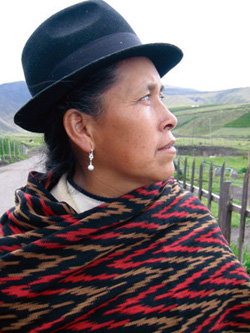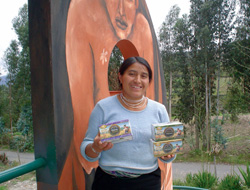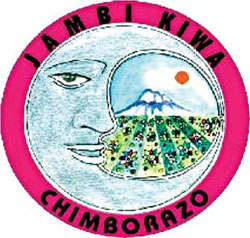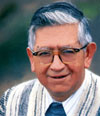THE SOCIAL ECONOMY
In Ecuador, members of Jambi Kiwa build on ancestral knowledge to help themselves and their communities
By Thomas Walsh
May 2005
Return to Table of Contents
Print Article
Rosa Guaman feels proud because the poor are helping themselves, believing in who they are and in their capacity to improve their economic and social situation. This is a huge turnaround for Rosa and others like her who are the last generation in Ecuador to be born and raised under the infamous hacienda system. The Indigenous Andean peoples worked for free, in virtual slavery to the hacienda owners, indebted and denied every basic right that today we take for granted.

Rosa Guaman, one of the founders of the Association of Medicinal Plant Producers, its first president and now the manager of Jambi Kiwa, their herbal tea and medicinal plant powder business.
Today, Rosa is one of the founders of the Association of Medicinal Plant Producers, its first president and now the manager of Jambi Kiwa, their herbal tea and medicinal plant powder business. Although Rosa only finished third grade, she manages a modern factory while negotiating sales with well-established tea and phyto-pharmaceutical companies. Her direct involvement and that of the other producers in this member-run business is an ingredient essential to its success. Their collaborative participation ensures that they assume ownership and responsibility for the project.
Community development
Jambi Kiwa (which in the indigenous language of Quichua means "plants that cure") is a good example of asset-based community development. By building on ancestral medicinal knowledge and agricultural experience, the members of Jambi Kiwa have created a business that in 2004 had US$53,000 in sales to Ecuador, Canada, Italy and the United States.
In January 2005, Jambi Kiwa moved into its new facilities on the outskirts of Riobamba and now has the potential to quadruple its production and sales within the next two years. A development strategy that builds on a community's local resources has a better chance of achieving its goals than a strategy that responds only to a community's needs.
Like any business, Jambi Kiwa requires financial, commercial and technical assistance to reach its vision of improving the social and economic conditions of its members. Its goal is to eliminate intermediaries and add value to its herbal products. Because the members are helping themselves, others have been willing to provide assistance. The Canadian Centre for International Studies and Cooperation (CECI) has contributed five people in the past seven years to assist in skills training, market studies, project development, and networking with other growers.
CIDA (Canada's International Development Agency), the Comart Foundation and Scarboro Missions have contributed significant financial resources and infrastructure. This assistance has made them partners in development with Jambi Kiwa, a solidarity that is highly appreciated and adds to the self esteem of the women and Indigenous people who mostly make up the Association's membership.
Jambi Kiwa's business of producing and marketing its herbal teas and medicinal plants requires a sound and well-managed organization and strong leadership. This is essential to overcoming the numerous and unpredictable obstacles that projects in the global South must confront as they become self-sustaining.
Since it began operations in April 2001, Jambi Kiwa has had to deal with a national financial crisis, uprisings, thieves, a new currency, volcanoes, droughts, dissatisfied producers and a host of other problems. Undaunted, the women of Jambi Kiwa communicate these situations to the members, who respond positively in various ways because they know that the business is theirs and that they are the ones to defend it.
Part of their strength comes from their association with other producers. Jambi Kiwa has taken the leadership and created the National Network of Medicinal Plant Producers, which now comprises eight businesses from as many provinces in the coastal, mountain and Amazonian areas of Ecuador. They exchange visits to learn from each other, have training workshops on themes of interest, and have successfully invited the tea and phyto-pharmaceutical clients to meet and negotiate sales and prices with them as a group. This networking is attractive to donors like CIDA, as it signals a potentially successful project.
Even greater strength has been found in Jambi Kiwa's participation at the international level. In 2003 and 2005 its leadership attended, with CECI's support, the World Social Forum in Brazil. Tens of thousands of activists meet at the Forum to discuss progress and new ideas for implementing a social order that will benefit all people in society. The event also brings together representatives of community-based enterprises. Jambi Kiwa shared its experiences with Asians, Africans and Canadians and has now amplified its network of contacts.
As an example of this international solidarity, Nova Scotia's successfully run Just Us Coffee cooperative-part of the international Fair Trade network-showed their support for Jambi Kiwa by contributing generously to the cost of the new factory.

María Olivia, tea seller at Jambi Kiwa, with boxes of tea in front of the factory.
I find it humbling to see the women make time to investigate in books and on the Internet the identity and use of the plants they grow and collect. With environmental licensing now becoming a norm for exporting herbs, the women are under pressure to establish natural resource management plans for each plant.
Since the beginning, healers and midwives have been active in the Association, as the rural Andes count on them for the health of their communities. This intellectual capacity was recognized in a commercial alliance with Ecuador's oldest tea company, CETCA, to export Jambi Kiwa's medicinal plant formulas under their joint labels and to share equally in the profits. Jambi Kiwa is able to piggy back on CETCA's long established distribution system and make use of its surplus industrial capacity. CETCA is able to add new products to its line and have access to the knowledge and experience of Jambi Kiwa's herbal growers.
In the current global marketplace dominated by profit-at-all-costs corporations, the participants in the development of the social economy have a tremendous challenge: They must be efficient and effective in the use of resources, while turning a profit and respecting the needs of the community and the environment. In the social economy, social capital becomes a valuable asset as networks, leadership and skills are developed, along with values, ethics and cultural appreciation.
In 1891, Pope Leo XIII strengthened the social doctrine of the Church with his encyclical, Rerum Novarum, teaching on capital and labour. In it, he dismissed capitalist economics as destructive to human well-being. Jambi Kiwa, with its incipient but determined efforts, is demonstrating that social economic alternatives are a development strategy that requires political support. Given the precarious situation of the world today, we can find hope in these initiatives that are being supported by international solidarity.

Visit Jambi Kiwa online at www.jambikiwa.org
For this small rural organization of mostly indigenous women, sharing in establishing a new world order demands a commitment to work at improving the social situation of their members. No longer can they be passive when faced with environmental destruction, or discrimination based on gender, race or sexual orientation. In development terms these issues cannot be separated from a successfully run business. Consequently, alongside the implementation of new factory infrastructure and organic cultivation and certification of herbs, there is training on domestic violence, the rights of women and children, literacy, and good work ethics and values that enhance an organization. It is in this training, after centuries of abuse, where Rosa and her associates begin the painfully slow work of recovering their self-identity and esteem.
Thomas Walsh joined Scarboro Missions in 1975. He and his wife Julia Duarte have served in Peru, Panama, Canada and now Ecuador. They have four children.
No longer slaves

Armella Sonntag
The Church as an agent for change and liberation
...the writings of Ecuador's Monseñor Leonidas Proaño (1910-1988)
Excerpts from "The Church of Riobamba: Indigenous Peoples, Changes, Conflicts and Results" (1982), a speech by Monseñor Leonidas Proaño, then bishop of the Diocese of Riobamba, Ecuador. Translated by Armella Sonntag (inset), former Scarboro missioner and member of ATIS (Association of Translators and Interpreters of Saskatchewan) for Spanish/English combinations. Scarboro missioners in Ecuador and Canada assisted in putting together this material, published with permission from Monseñor Victor Corral, Bishop of Riobamba.
What did huasipungo consist of?
A landowner, let's say with 15 or 20 thousand hectares on his hacienda, relies on a number of indigenous workers: 800, 1,000 or more, who become like the hacienda owner's property.
The landowner would assign two or three hectares of poor quality land, called huasipungo, to the head of the indigenous family and give him a straw hut for housing. In exchange for this – which was considered as pay for his work – the head of the family, the wife, the children, were obliged to work in the hacienda five days of the week. Only on Saturday and Sunday could they dedicate themselves to work on that small parcel of land. They also had some rights: they could feed a fold of sheep and an even more limited number of cattle on the high plateaus of the hacienda; they had the right to the firewood of the mountainsides, the use of the water and the roads.
During the whole year not one of the indigenous families could extract the bare essentials for their sustenance from their huasipungo. Each head of the family would be obliged to go to the hacienda's manager to ask for an advance or 'supplement' in potatoes, grains and other food. Each family would promise to pay that debt with their work.
If they were already employed in the obligatory work of the hacienda five days of the week, where were the indigenous peasants going to get more days to be able to pay off the debt? Therefore, they fell into debt one year, this grew the following year, and each year that went by meant a new growth in debt. They were as good as sold to the hacienda in a permanent way from generation to generation.
The manager kept a meticulous accounting of the days of work that the peasants owed. If the father of the family died, his children and widow inherited the debt; they remained enchained their whole life – a true slavery.
This reality cried out for change, a structural change... That is why we are talking of commitment and that the Church should be considered as a factor for change...
If the Reign of God has been incarnated into humanity and has taken on all our miseries, all our weaknesses, then we also now have the obligation to incarnate the Word – that same Word of God – into the reality, which befalls us to work pastorally as those sent by Christ. In practice, we have united conscientizing [developing a critical awareness] and evangelizing...
Some popular expressions used (by the Indigenous peoples) in relation to the process of conscientization and evangelization have been: "We were living like blind people, we were living in darkness and now we see" and "individually we can do nothing, we are incapable of getting anything; we have to unite, to organize ourselves."
...What have been the results? This oppressed man, this man without a voice...who was crushed and ground under, has recovered his voice. Now he speaks; now he sees; now he walks; now he hears; now he protests. He is no longer afraid to appear before the authorities...
It would be false, though, to leave the impression that we (the Church) have been the only ones (engaged in this work). Many people have been involved, people who have not belonged to the Church. In recent years there has also been some work by the government and international bodies.
As a result of all that combined effort and work, there is now a better distribution of land and those huge haciendas are disappearing. The Church has set an example. The Church was also a landowner, but it handed over its properties to the government in order to carry out agrarian reform...
As we can see, the Church is and can be a factor for change. Together, we are called to commit ourselves with the poor, to make that preferential option for them and to contribute greatly to change, to transformation, to a change of structures. Not only to a superficial change, of band-aids, but rather to a change of structures, of social structures and mental structures. We can achieve that.
Bishop of the poor

Monsignor Leonidas Proaño
Excerpted from "Resurrection of a people" by Christopher David, The Tablet.
Monseñor Leonidas Proaño died in 1988, deeply loved and mourned by the Indigenous peoples in Ecuador. He had become bishop of the Diocese of Riobamba in 1954. Two-thirds of its 400,000 population are Quichua-speaking Indigenous peoples...
Bishop Proaño saw their suffering. He wept when the children presented themselves for Confirmation, undernourished and so dirty that there was no inch of skin to make the sign of the cross on their foreheads. His answer was to give up his episcopal palace in Riobamba to live among them. He spent the next 31 years establishing centres for Christian education and learning, struggling for the rights of Indigenous peoples against their landowners. He handed over to them the large estates held at that time by the Church...
He described himself as a liberator of the Gospel, "so that those who were blind might see, those who had lost the Word through oppression and had become dumb might speak, and those who felt paralyzed because of their mistreatment for centuries might walk and organize themselves as a people."
...He began the education and training of a laity that would respect and make use of Quichua culture, that would take into account indigenous myths and rituals, their oral traditions, their sense of community and their reverence for Mother Earth.
Return to Table of Contents
Print Article